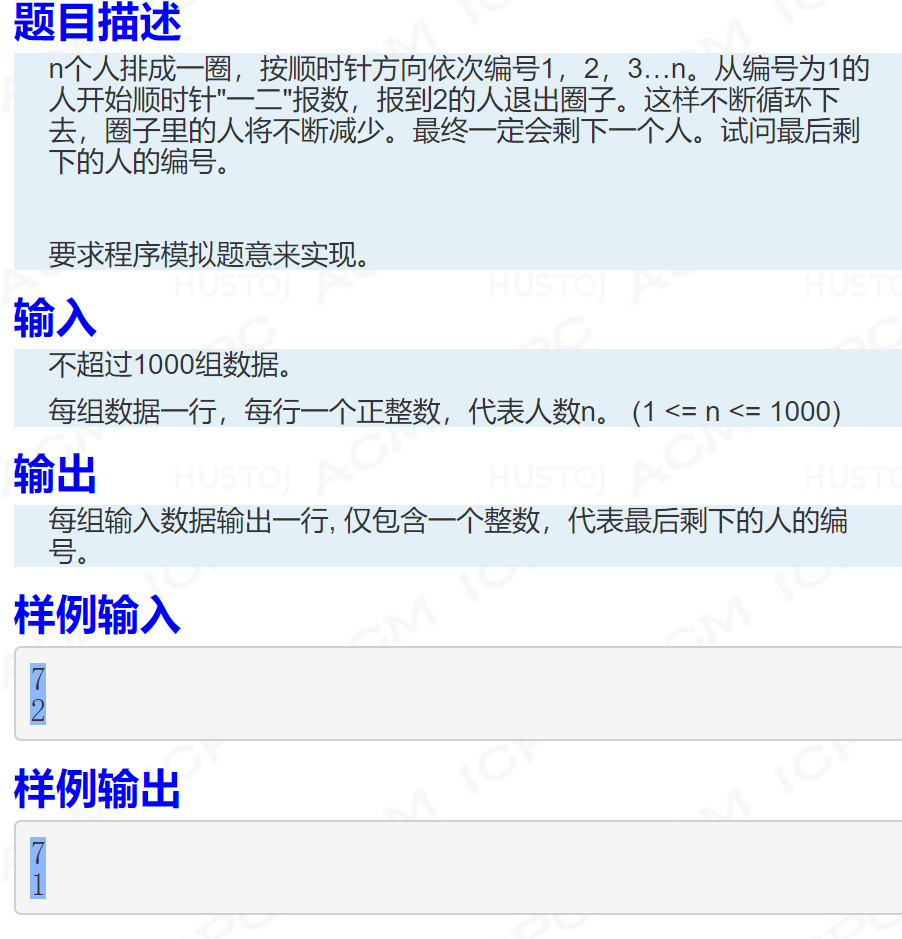Josephus problem(约瑟夫问题,丢手绢问题)
约瑟夫问题
约瑟夫环问题是一个数学应用题:已知n个人(以编号1,2,3.....,n)围坐在一张圆桌的周围。从编号为k的人开始报数,数到m的那个人出列:他的下一个人又从1开始报数,数到m的那个人又出列,以此规律重复下去,直到圆桌的人全部出列。通常解决这类问题时我们把编号从0-n-1,最后+1即为原问题的解。
一、算法描述:
约瑟夫环运作如下:
- 一群人围在一起坐成环状
- 从某个编号开始报数(如:K)
- 数到某个数(如:M)的时候,此人出列,下一个人重新报数
- 一直循环,直到所有人出列 ,约瑟夫环结束
二、解决此类问题的解法
C语言 模拟递归法
公式推导法
#include <stdio.h> #include <stdlib.h> struct _Node { int data; struct _Node *next; }; typedef struct _Node node_t; typedef struct _Linklist { node_t *phead; node_t *ptail; int len; } Linklist; static node_t *GetNode(int i) //新建并初始化节点 { node_t *pNode; pNode = (node_t *)malloc(sizeof(node_t)); if (!pNode) { printf("Error,thememoryisnotenough!\n"); exit(-1); } pNode->data = i; pNode->next = NULL; return pNode; } void init_list(Linklist *plist) //用第一个节点初始化循环单链表 { node_t *p; p = GetNode(1); //printf("TheNewNodeis:%d\n",p->data);//****TEST**** plist->phead = p; plist->ptail = p; p->next = plist->phead; plist->len = 1; } static void Create_List(Linklist *plist, int n) //把其余数据添加到循环单链表中 { int i = 0; node_t *pNew; for (i = 2; i <= n; i++) { pNew = GetNode(i); /********TEST******** printf("TheNewNodeis:%d\n",pNew->data); ********TEST********/ plist->ptail->next = pNew; plist->ptail = pNew; pNew->next = plist->phead; plist->len++; } printf("Completesthee-waycirculationchaintablethefoundation!\n"); } void Print_List(Linklist *plist) //输出链表内容 { node_t *pCur = plist->phead; do { printf("The%dperson.\n", pCur->data); pCur = pCur->next; } while (pCur != plist->phead); printf("ThelengthoftheList:%d\n", plist->len); } // 约瑟夫回环函数实现 void joseph(Linklist *plist, int m) //约瑟夫回环函数实现 { node_t *pPre = plist->ptail; node_t *pCur = plist->phead; int i; while (plist->len != 1) { i = 0; while (i < m - 1) { pPre = pPre->next; i++; } pCur = pPre->next; pPre->next = pCur->next; free(pCur); plist->len--; } printf("Thelastoneis:%d\n", pPre->data); } int main() { int n = 0; printf("PleaseinputtheLengthoftheCirclelist:"); scanf("%d", &n); int m = 0; printf("PleaseinputtheStoppoint:"); scanf("%d", &m); Linklist pList; init_list(&pList); Create_List(&pList, n); Print_List(&pList); joseph(&pList, m); return 0; }
三、OJ 例题
题目描述

解题思路:
1<=n<1000发现数据量不大,直接模拟游戏求出最后一个人
下面是非递归使用for循环代码
#include <stdio.h> #include <stdlib.h> int main() { int n; while (scanf_s("%d", &n) == 1) { int len, i, j=1; int count = n;//当前存在的人数 当count == 1剩下最后一个人 即为答案 int a[1002] = { 0 };//初始化模拟数组 for (i = 0; i < n; i++)//人数从1~n数组标示从0~n-1 { if (count == 1) break; if (a[i] == 0)//a[i]==1表示这个人已经退出游戏 { if (j % 2 == 0) { a[i] = 1; count--;//删掉一个人 } else { if (i + 1 >= n)//数组循环即 当i往下大于人数n时需要从0开始 但是由于是for 循环i会++ 所以i置为-1 i = -1; } j++; } else { if (i + 1 >= n) i = -1;//同上 } if (i == n-1) i = -1;//同上 } for (i = 0; i < n; i++) if (a[i]==0) printf("%d\n", i + 1); } }
非递归使用while循环
#include <stdio.h> #include <stdlib.h> int main() { int n; while(scanf("%d",&n)==1) { int i=1,len,a[1006]={0}; int flag=1; len=n-1; while(len) { if(a[i]==0) { if(flag==1) { i++; if(i>n) i=1; flag=2; } else { a[i]=1; i++; if(i>n) i=1; flag=1; len--; } } else { i++; if(i>n) i=1; } } for(i=1;i<=n;i++) if(a[i]==0) printf("%d\n",i); } }
题目数字较大的时候可以采用公式推导法,参考下面链接的博客



